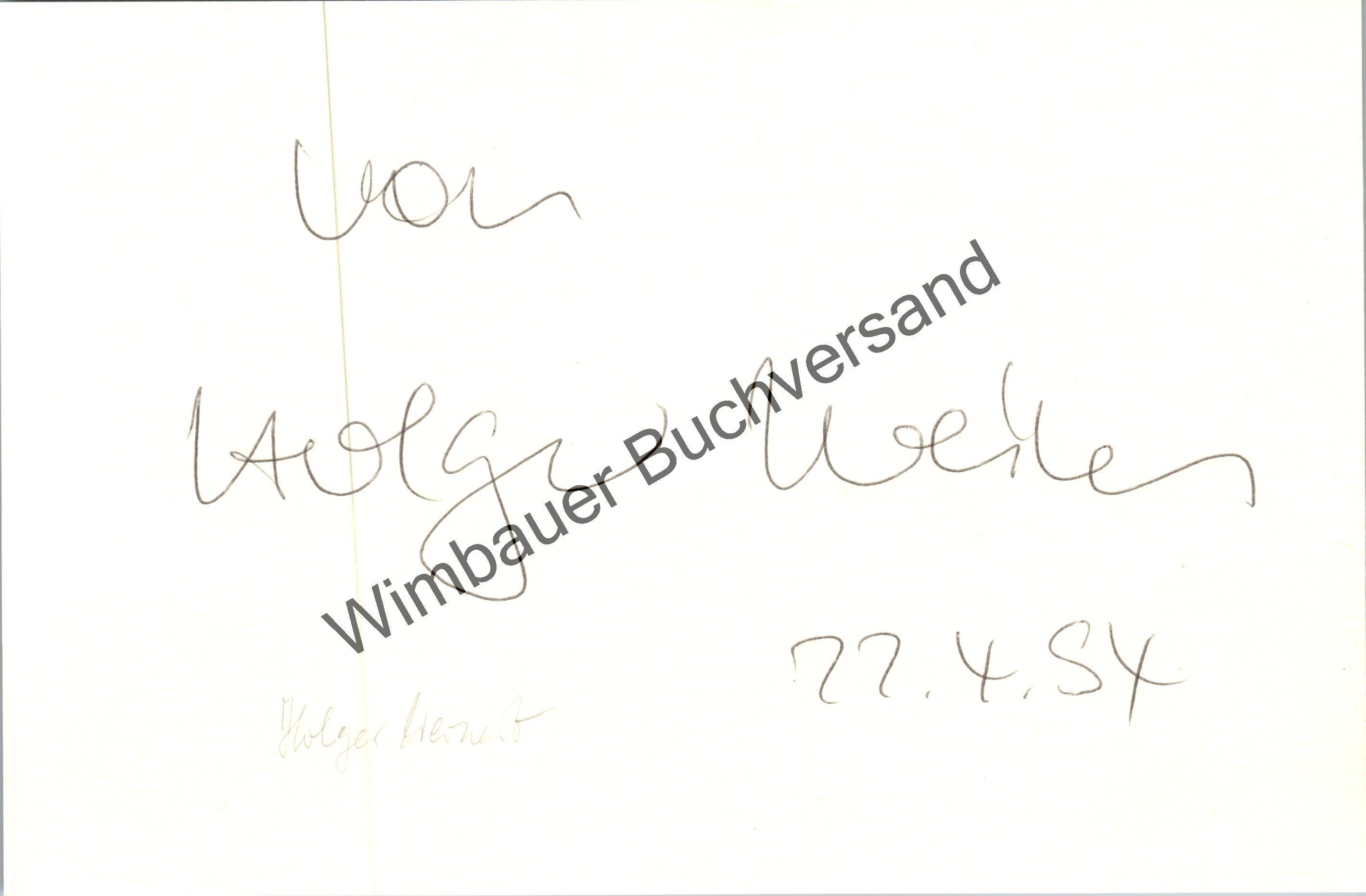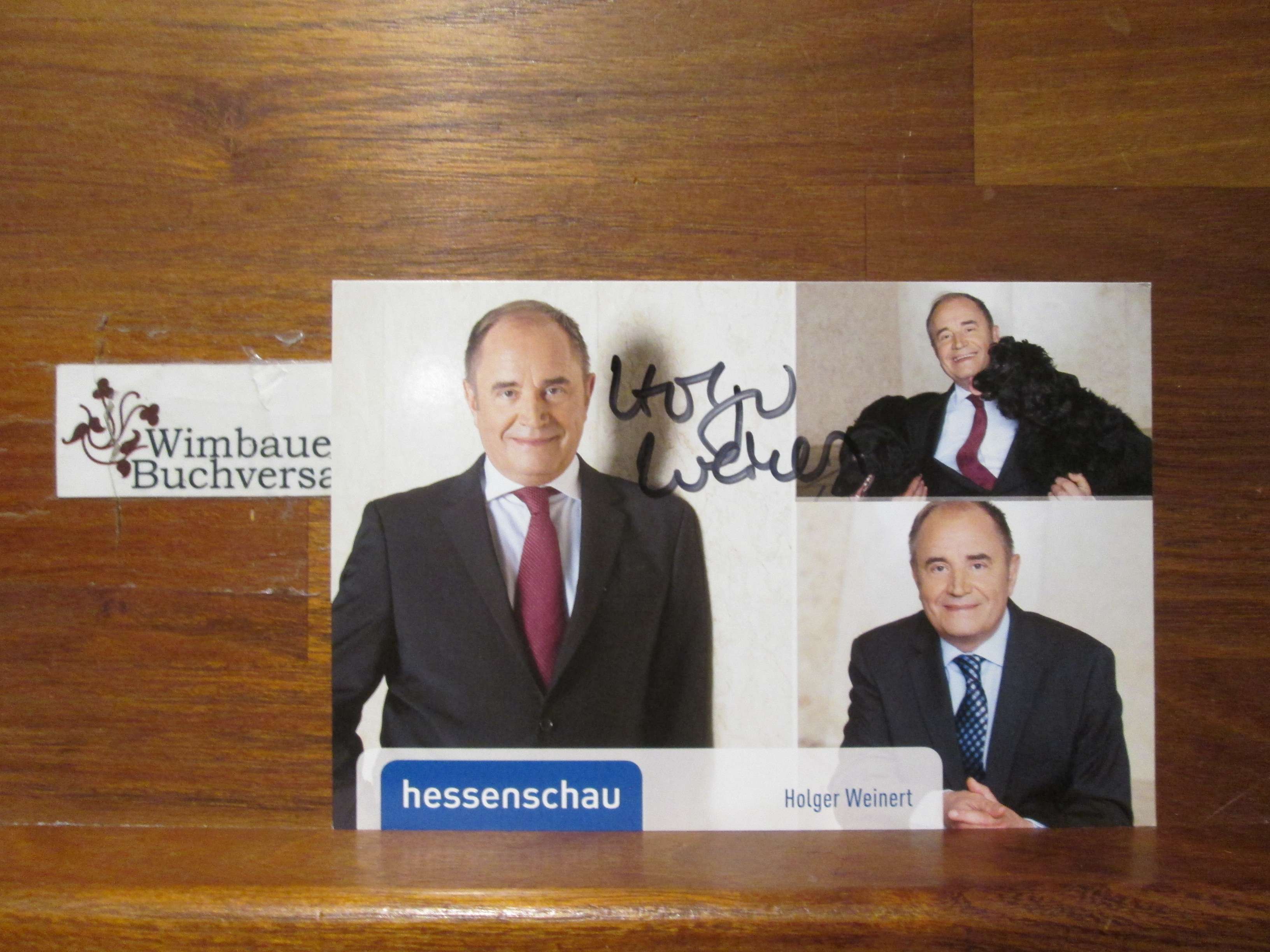Holger Weinert: Master Of German Expressionist Poetry - A deep dive into his famous work and his impact on literature.

Original Autogramm Holger Weinert Hessenschau /// Autogramm Autograph - Source www.zvab.com
Editor's Note: "Holger Weinert: Master Of German Expressionist Poetry" have published today date. This work offers incisive analysis of one of the iconic figure of the german expressionist literary movement. The guide is geared towards those with a keen interest in German literature, poetry, and the broader Expressionist movement of the early 20th century.
Our team has analyzed and researched Holger Weinert's works, and compiled this guide to provide readers with a comprehensive understanding of his life and work.
Key differences or Key takeaways:
Transition to main article topics

Original Autogramm Holger Weinert Hessenschau /// Autogramm Autograph - Source www.zvab.com
FAQ
Explore the multifaceted artistry of Holger Weinert, a German Expressionist pioneer whose poetic prowess shaped the literary landscape of the early 20th century. Holger Weinert: Master Of German Expressionist Poetry This section elucidates common queries and misconceptions surrounding his work, providing insights into his distinctive style and enduring legacy.
Question 1: What distinguishes Holger Weinert's Expressionist approach in poetry?
Weinert's Expressionist style manifested in his fervent use of subjective emotions, raw imagery, and distorted perspectives. Through rhythmic experimentation and evocative language, he sought to convey the inner turmoil and heightened experiences of a society grappling with social and political upheaval.
Question 2: What thematic elements are prevalent in Weinert's poetic corpus?
Weinert's poetry delved into themes of urban alienation, the plight of the working class, and a fervent longing for social justice. He skillfully blended social criticism with lyrical beauty, challenging societal norms and advocating for a more equitable and compassionate world.
Question 3: In what ways did Weinert incorporate political commentary into his poetry?
Weinert was an ardent political activist whose Marxist beliefs deeply influenced his writing. His poetry became a platform for him to express his opposition to fascism, war, and the oppression of the proletariat. Through his poignant verses, he aimed to galvanize readers and inspire social change.
Question 4: How did Weinert's experiences shape his poetic perspective?
Weinert's upbringing in a working-class family and his firsthand witness to the atrocities of World War I profoundly shaped his worldview. These experiences fueled his empathy for the marginalized and his determination to use poetry as a weapon against injustice and inequality.
Question 5: What impact did Weinert's literary output have on German Expressionism?
Weinert played a crucial role in the development and dissemination of German Expressionism. His innovative techniques and unwavering commitment to social consciousness influenced a generation of poets, paving the way for a new era of literary expression in Germany and beyond.
Question 6: What is Weinert's enduring legacy as a master of Expressionist poetry?
Holger Weinert remains an iconic figure in German Expressionism, remembered for his ability to fuse artistic brilliance with a profound social conscience. His poetry continues to resonate with readers today, offering a timeless reflection on the human condition and the enduring struggle for justice and equality.
This FAQ section provides a comprehensive overview of Holger Weinert's literary achievements and the significance of his Expressionist poetry in the German literary landscape. Exploring his unique style, thematic concerns, and political activism, we gain a deeper understanding of his enduring legacy as a master of his craft.
Tips
Mastering German Expressionist poetry requires delving into its unique characteristics, embracing its emotional intensity, and developing a profound understanding of its literary techniques. To assist in this endeavor, here are some essential tips:
Tip 1: Embrace Emotional Intensity
German Expressionist poetry is renowned for its raw and unbridled emotions. To effectively capture this aspect, poets must allow their feelings to guide their words, expressing them with boldness and authenticity. Unrestrained passion, anguish, and ecstasy should permeate the verses, evoking a visceral response in readers.
Tip 2: Utilize Symbolism and Metaphor
Expressionist poets often employ symbolism and metaphor to convey complex ideas and emotions. By associating abstract concepts with concrete objects or events, they create evocative imagery that deepens the impact of their words. Symbolism and metaphor allow poets to transcend literal meaning, inviting readers to explore hidden depths and multiple layers of interpretation.
Tip 3: Experiment with Form and Structure
Breaking away from traditional poetic conventions, Expressionists experimented with typography, grammar, and punctuation. They used bold formatting, irregular line lengths, and unconventional syntax to create visual impact and emphasize certain words or phrases. This experimentation with form aimed to convey the urgency and disorientation characteristic of the Expressionist movement.
Tip 4: Study the Masters
Immerse yourself in the works of Expressionist trailblazers such as Franz Werfel, Georg Trakl, and Gottfried Benn. Analyze their techniques, themes, and perspectives to gain insights into the essence of this movement. By studying the masters, poets can absorb their creative approaches and develop their own unique interpretations.
Tip 5: Find Your Voice
While learning from the masters is essential, it is equally important to develop your own poetic voice. Embrace your unique experiences, emotions, and perspectives, and let them shape your writing. Experiment with different styles, themes, and techniques to discover what resonates with you and allows you to express your own vision through German Expressionist poetry.
These tips provide a foundation for aspiring German Expressionist poets to explore the depths of this evocative and powerful genre. By embracing emotional intensity, utilizing symbolism and metaphor, experimenting with form and structure, studying the masters, and finding your own voice, poets can create works that capture the raw and expressive spirit of German Expressionism.
Holger Weinert: Master Of German Expressionist Poetry
Holger Weinert, a prominent figure in German Expressionist poetry, left an enduring legacy with his evocative and socially conscious literary contributions. Several key aspects encapsulate his mastery:
- Passionate Expressionism: Weinert's verses pulsate with raw emotions, vividly capturing the turmoil and upheaval of his era.
- Social Commentary: His poetry served as a poignant critique of the social injustices and inequalities he witnessed.
- Anti-War Sentiment: A staunch pacifist, Weinert's works condemned the horrors and futility of war.
- Lyrical Mastery: His command of language and rhythm allowed him to convey complex emotions with simplicity and depth.
- Political Activism: Weinert's poetry often aligned with the political movements he supported, advocating for a just and equitable society.
- Literary Legacy: His works have deeply influenced subsequent generations of German poets and continue to resonate with readers today.
These aspects intertwine to form the essential tapestry of Holger Weinert's poetry, reflecting his profound engagement with the human condition and his unyielding commitment to social change. His ability to fuse personal experiences with broader societal concerns through the power of verse exemplifies the transformative nature of literature.

Floßfahrt mit Holger Weinert auf der Werra | Wanfried - Source www.werra-rundschau.de
Holger Weinert: Master Of German Expressionist Poetry
Holger Weinert was a German poet, writer, and journalist. He was born in 1897 in Charlottenburg, Germany, and died in 1958 in Berlin. Weinert was a leading figure in the German Expressionist movement, and his work is characterized by its use of vivid imagery, strong emotions, and social commentary.

Prof. Dr. Dr. Holger Patzelt – TUM Entrepreneurial Masterclass - Source masterclass.tum.de
Weinert's work was influenced by the political and social upheavals of his time. He was a strong supporter of the working class, and his poems often expressed his anger at the injustices of society. Weinert was also a pacifist, and he wrote many poems against war.
Weinert's work has been translated into many languages, and he is considered to be one of the most important German poets of the 20th century. His work continues to be read and studied today, and it remains a powerful testament to the human spirit in the face of adversity.
Conclusion
Holger Weinert was a master of German Expressionist poetry. His work is characterized by its use of vivid imagery, strong emotions, and social commentary. Weinert's work was influenced by the political and social upheavals of his time, and he was a strong supporter of the working class and a pacifist.
Weinert's work has been translated into many languages, and he is considered to be one of the most important German poets of the 20th century. His work continues to be read and studied today, and it remains a powerful testament to the human spirit in the face of adversity.
